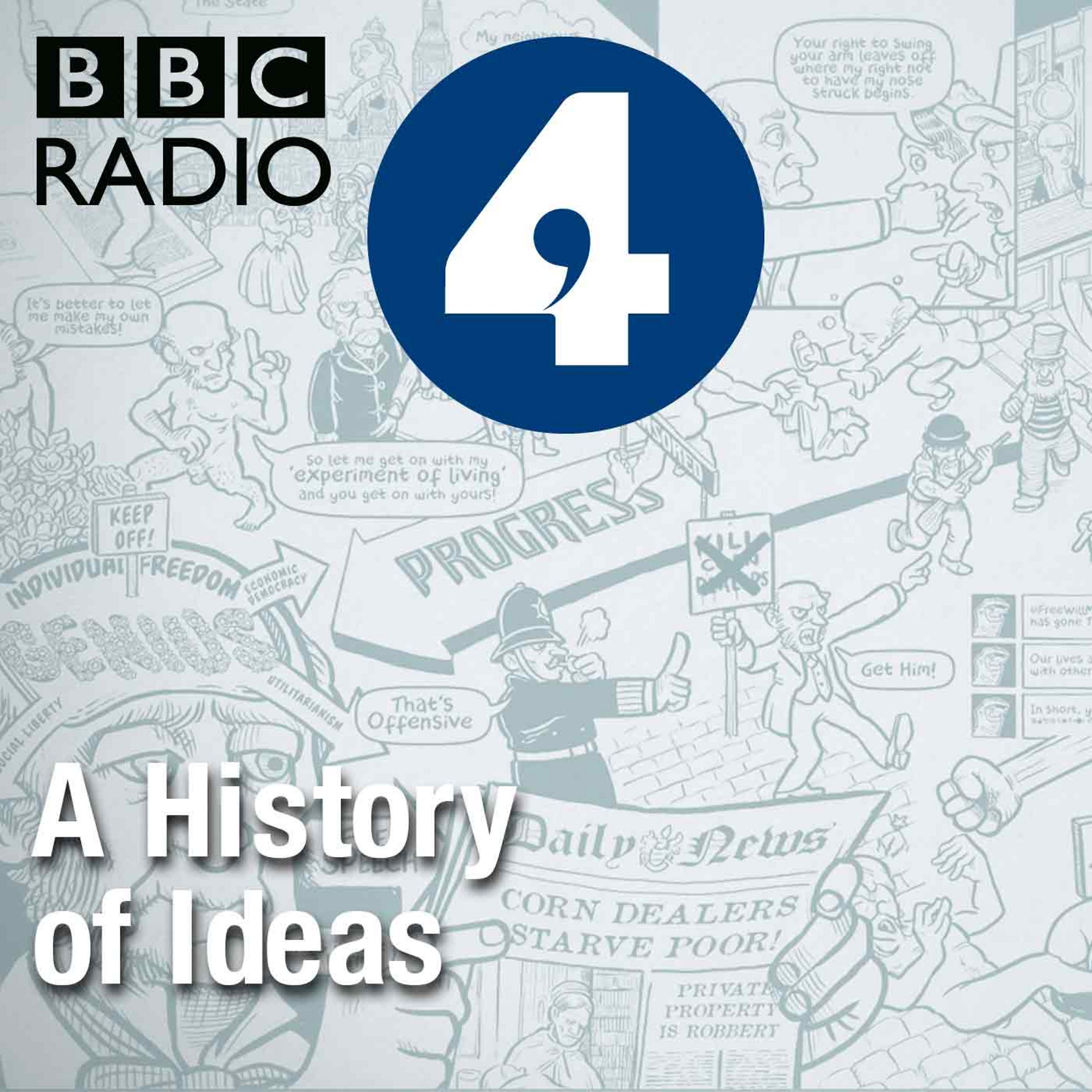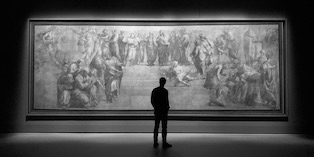 Twitter: @BBCRadio4
Twitter: @BBCRadio4Site: www.bbc.co.uk/programmes/b04bwydw
60 episodes
2014 to 2015
Average episode: 13 minutes
Open in Apple Podcasts • RSS

 Twitter: @BBCRadio4
Twitter: @BBCRadio4
Site: www.bbc.co.uk/programmes/b04bwydw
60 episodes
2014 to 2015
Average episode: 13 minutes
Open in Apple Podcasts • RSS
Categories: Broadcast Radio Programs • Interview-Style
Podcaster's summary: Melvyn Bragg and guests discuss the work of key philosophers and their theories.
| Episodes |
| 2015-Aug-07 • 13 minutes Neuropsychologist Paul Broks on Wittgenstein Paul Broks looks at the philosopher Ludwig Wittgenstein and the problem of 'other minds'. |
| 2015-Aug-06 • 13 minutes Philosopher Clare Carlisle on Reality and Perception Clare Carlisle grapples with Bishop Berkley's idea that objects only exist in our minds. |
| 2015-Aug-05 • 13 minutes Physicist Tara Shears on Falsification How can we separate real science from mumbo jumbo? Physicist Tara Shears investigates. |
| 2015-Aug-04 • 13 minutes Lawyer Harry Potter on Eyewitness Testimony Barrister Harry Potter on whether we can believe our eyes. |
| 2015-Aug-03 • 13 minutes How Can I Know Anything at All? Melvyn Bragg and guests discuss how we can know anything at all. |
| 2015-Jul-31 • 13 minutes Writer Lisa Appignanesi on the Love of Children How should we love our children? Philosopher Jean-Jacques Rousseau had some great ideas. |
| 2015-Jul-30 • 13 minutes Psychotherapist Mark Vernon on Freud What is love? Psychotherapist Mark Vernon looks at Freud's ideas on the Greek god Eros. |
| 2015-Jul-29 • 13 minutes Theologian Giles Fraser on Altruism Giles Fraser discusses gene theory versus altruism with Tom Stoppard and Armand Leroi. |
| 2015-Jul-28 • 13 minutes Classicist Edith Hall on Aristophanes in Plato Classicist Edith Hall on Aristophanes's explanation of love. |
| 2015-Jul-27 • 13 minutes What Is Love? Melvyn Bragg and guests discuss the history of ideas around love. |
| 2015-Jul-24 • 13 minutes Philosopher Timothy Secret on Ancestor Worship Timothy Secret on Confucius. To live well together we must first consider the dead. |
| 2015-Jul-23 • 13 minutes Philosopher Angie Hobbs on Plato's Philosopher Kings Angie Hobbs asks if the ideal state would be run by philosophers not politicians. |
| 2015-Jul-22 • 13 minutes Economist Kate Barker on the Free Market Is a free market the best foundation for a fair, dynamic society? |
| 2015-Jul-21 • 13 minutes Historian Justin Champion on Toleration Professor Justin Champion examines Locke's Letter on Toleration. |
| 2015-Jul-20 • 13 minutes How Should We Live Together? Melvyn Bragg and guests debate how we should live together. |
| 2015-Apr-17 • 13 minutes Philosopher Barry Smith on Descartes and Consciousness Philosopher Barry Smith explores ideas about consciousness. |
| 2015-Apr-16 • 13 minutes Philosopher Jules Evans on Jung and the Mind Jules Evans explores Jung and the shadow inside all of us. |
| 2015-Apr-15 • 13 minutes Writer AL Kennedy on Sartre and the Individual Writer AL Kennedy explores existentialist ideas about the individual. |
| 2015-Apr-14 • 13 minutes Paul Broks on John Locke and Personal Identity Paul Broks asks how we can be sure we are the same person that we were yesterday. |
| 2015-Apr-13 • 13 minutes What Does It Mean to Be Me? Barry Smith, Paul Broks, AL Kennedy and Jules Evans discuss the self. |
| 2015-Apr-10 • 13 minutes Historian Alice Taylor on Habeas Corpus Historian Alice Taylor on the slippery justice of extrajudicial detention. |
| 2015-Apr-09 • 13 minutes Thomas Hobbes and Civil Disobedience Criminologist David Wilson looks at Thomas Hobbes and his 'social contract' theory. |
| 2015-Apr-08 • 13 minutes Philosopher Angie Hobbs on the Veil of Ignorance Angie Hobbs, Leif Wenar and David Runciman debate and explore the ideas of John Rawls. |
| 2015-Apr-07 • 13 minutes Barrister Harry Potter on Deterrence In this edition of a series of programmes on justice, Harry Potter examines deterrence. |
| 2015-Apr-06 • 13 minutes What Is Justice? Melvyn Bragg and guests discuss ideas about justice. |
| 2015-Apr-03 • 13 minutes Ayn Rand and Selfishness Neuropsychologist Paul Broks looks at the idea of leading a good life by being selfish. |
| 2015-Apr-02 • 13 minutes Naomi Appleton on the Buddha's Four Noble Truths Naomi Appleton explores the Buddha's Four Noble Truths. |
| 2015-Apr-01 • 13 minutes Justin Champion on Max Weber and the Protestant Ethic Justin Champion looks at the roots of our culture's belief in the moral power of hard work |
| 2015-Mar-31 • 13 minutes Philosopher Jules Evans on Aristotle and Flourishing Philosopher Jules Evans asks Gus O'Donnell how to measure the good life. |
| 2015-Mar-30 • 13 minutes How Do I Live a Good Life? Melvyn Bragg and guests discuss how to live a good life. |
| 2015-Jan-30 • 13 minutes Archaeologist Matt Pope on tools and human evolution Archaeologist Matt pope looks at the role of technology in early human evolution. |
| 2015-Jan-29 • 13 minutes Surgeon Gabriel Weston on medical technology Surgeon Gabriel Weston sees how medical technology has changed us. |
| 2015-Jan-28 • 12 minutes Historian Justin Champion on Francis Bacon Historian Justin Champion on 17th-century polymath Francis Bacon. |
| 2015-Jan-27 • 13 minutes Writer Tom Chatfield: Has technology rewired our brains? Tom Chatfield on whether modern technology enhances or diminishes us. |
| 2015-Jan-26 • 13 minutes How Has Technology Changed Us? Melvyn Bragg is joined by Tom Chatfield, Gabriel Weston, Justin Champion and Matt Pope. |
| 2015-Jan-23 • 13 minutes Giles Fraser on Wittgenstein and Blade Runner Theologian Giles Fraser on Wittgenstein and Blade Runner |
| 2015-Jan-22 • 13 minutes Barry Smith on Noam Chomsky and Human Language Philosopher Barry Smith on Noam Chomsky and human language |
| 2015-Jan-21 • 13 minutes Catharine Edwards on Seneca and facing death. Only humans know they will die. Catharine Edwards on the Stoic philosopher Seneca |
| 2015-Jan-20 • 13 minutes Simon Schaffer on humans, apes and Carl Linnaeus Simon Schaffer on botanist Carl Linnaeus who first classified humans among the apes |
| 2015-Jan-19 • 12 minutes What Makes Us Human? Melvyn Bragg and guests discuss what makes us human. |
| 2015-Jan-16 • 12 minutes Historian Justin Champion on William Whiston's Comet Theory Historian Justin Champion on William Whiston, the spiritual father of the Philae lander. |
| 2015-Jan-15 • 12 minutes Theologian Giles Fraser on Thomas Aquinas Theologian Giles Fraser on brilliant medieval scholar St Thomas Aquinas. |
| 2015-Jan-14 • 12 minutes Astronomer Carole Mundell on the Big Bang What put the bang in the Big Bang? Can scientists tell us what happened before creation? |
| 2015-Jan-13 • 12 minutes Jessica Frazier on Creation Myths How did the world begin? Jessica Frazier canvases the views of the great religions. |
| 2015-Jan-12 • 12 minutes How Did Everything Begin? Melvyn Bragg and guests discuss the origins of everything. |
| 2014-Nov-28 • 12 minutes Philosopher Angie Hobbs on the Value of Conscience Philosopher Angie Hobbs on the value of conscience and moral intuition. |
| 2014-Nov-27 • 12 minutes Lawyer Harry Potter on Morality and the Law Lawyer Harry Potter examines whether the law should enforce good morals. |
| 2014-Nov-26 • 12 minutes Neuro-psychologist Paul Broks on Morality and the Brain Neuropsychologist Paul Broks on moral decisions and the brain. |
| 2014-Nov-25 • 12 minutes Theologian Giles Fraser on Moral character Giles Fraser on moral character and Aristotle's Virtue ethics |
| 2014-Nov-24 • 12 minutes How Can I Tell Right From Wrong? Melvyn Bragg and guests discuss different ideas of morality. |
| 2014-Nov-21 • 12 minutes Philosopher Angie Hobbs on Beauty and Morality Philosopher Angie Hobbs examines whether beautiful things are also moral. |
| 2014-Nov-20 • 12 minutes Historian Simon Schaffer on Beauty and Evolution Historian Simon Schaffer on whether evolutionary science explains the existence of beauty. |
| 2014-Nov-19 • 12 minutes Vicky Neale on the Mathematics of Beauty Mathematician Vicky Neale on the mathematics of beauty and the beauty of mathematics. |
| 2014-Nov-18 • 12 minutes Barry Smith on the Philosophy of Good Taste Philosopher Barry Smith on David Hume's ideas about cultivating good taste. |
| 2014-Nov-17 • 12 minutes Why Are Things Beautiful? Melvyn Bragg and guests discuss different ideas of beauty. |
| 2014-Nov-14 • 12 minutes Neuroscientist Paul Broks on Free Will and the Brain Paul Broks brings neuroscience to the philosophical question of whether we have free will. |
| 2014-Nov-13 • 12 minutes Theologian Giles Fraser on Religious Freedom Theologian Giles Fraser believes true freedom comes from accepting constraints in life. |
| 2014-Nov-12 • 12 minutes Lawyer Harry Potter on Individual Freedom and the State Barrister Harry Potter on John Stuart Mill's ideas about individual freedom and the state. |
| 2014-Nov-11 • 12 minutes Philosopher Angie Hobbs on Positive and Negative Freedom Angie Hobbs on Isaiah Berlin's distinction between positive and negative freedom. |
| 2014-Nov-10 • 12 minutes What Does It Mean to Be Free? Melvyn Bragg and guests discuss the history of ideas about freedom. |